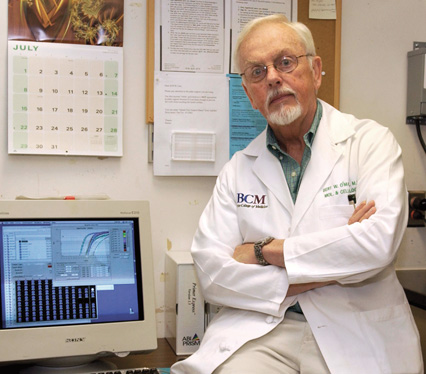Bert W. O’Malley to Speak at Pitt 2009 Commencement Renowned cellular biologist is “father of molecular endocrinology” and National Medal of Science honoree
 Bert W. O’Malley
Bert W. O’MalleyNational Medal of Science honoree Bert W. O’Malley, a pioneering researcher in the field of biological sciences who earned his Bachelor of Science and Doctor of Medicine degrees at the University of Pittsburgh, will be the featured speaker during Pitt’s 2009 Commencement on April 26. The ceremony, at which Pitt will confer upon O’Malley the honorary Doctor of Science degree, will begin at 1 p.m. in the Petersen Events Center.
O’Malley holds the Thomas C. Thompson Chair in Cell Biology and chair of the Department of Molecular and Cellular Biology at the Baylor College of Medicine (BCM) in Houston.He also directs BCM’s Center for Reproductive Biology and is associate director for basic science in the school’s Dan L. Duncan Cancer Center.
“Building from the foundation of his University of Pittsburgh education, which included both his undergraduate and his medical school years, Bert O’Malley has earned a reputation as one of the world’s best-known and most-respected scientists,” said Pitt Chancellor Mark A. Nordenberg. “He has made significant contributions to our understandings of endocrinology, reproduction, genetic disease, and cancer. Earlier in this academic year, he was awarded the National Medal of Science, this nation’s highest scientific honor. It is a real privilege to invite him back to campus as our commencement speaker.”
O’Malley received the Bachelor of Science degree from Pitt’s School of Arts and Sciences in 1959 and Doctor of Medicine degree from Pitt’s School of Medicine in 1963. He is highly esteemed in the fields of endocrinology, reproduction, genetic disease, and endocrine cancers.
Often referred to as the “father of molecular endocrinology,” O’Malley is credited with pathbreaking insights into the function of hormones in normal development and disease states. His lab discoveries are now being applied clinically to understand fertility regulation and reproductive tissue differentiation, as well as predispositions to reproductive cancers. He also initiated what is now called “team science” and has trained more than 250 students and postdoctoral fellows in his lab.
At a White House ceremony on Sept. 29, 2008, O’Malley received the 2007 National Medal of Science from former President George W. Bush. Administered by the National Science Foundation, the medal is the nation’s highest honor for science and engineering.
O’Malley has served as president of the Endocrine Society and was instrumental in establishing the journal Molecular Endocrinology, one of the most-cited peer-reviewed biomedical science journals. O’Malley has written more than 600 scientific and medical publications and holds 19 patents for special techniques and inventions related to molecular and cellular biology.
Pitt has honored O’Malley with the Dickson Prize in Medicine, the Philip S. Hench Distinguished Alumnus Award, and the Bicentennial Medallion of Distinction. O’Malley has received numerous additional honors, including the Academia Nazionale dei Lincei Antonio Feltrinelli International Prize for Biology and the Brinker International Award for Breast Cancer Research. He also was elected to the U.S. National Academy of Sciences and the Royal Academy of Medicine in Ireland.
Other Stories From This Issue
On the Freedom Road

Follow a group of Pitt students on the Returning to the Roots of Civil Rights bus tour, a nine-day, 2,300-mile journey crisscrossing five states.
Day 1: The Awakening
Day 2: Deep Impressions
Day 3: Music, Montgomery, and More
Day 4: Looking Back, Looking Forward
Day 5: Learning to Remember
Day 6: The Mountaintop
Day 7: Slavery and Beyond
Day 8: Lessons to Bring Home
Day 9: Final Lessons

